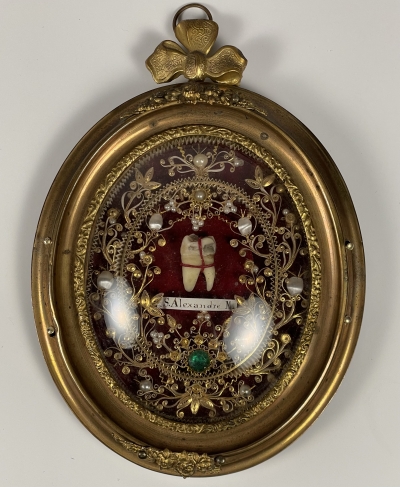Saint Alexander, Bishop of Jerusalem and Martyr (†251 AD) had been imprisoned for his faith in the time of Roman Emperor Alexander Severus. After his release, he came to Jerusalem, where the aged Bishop Narcissus prevailed on Alexander to remain and assist him in the government of that see. Alexander was praised for the library he built in Jerusalem. In spite of his years, he, with several other bishops, was carried off a prisoner to Caesarea, and as the historians say, "The glory of his white hairs and great sanctity formed a double crown for him in captivity". His vita states that he suffered many tortures, but survived them all. When the wild beasts were brought to devour him, some licked his feet. Thrown into prison, he stayed there for quite a long time and died from beheading with a sword. His feast is kept by the Roman Catholic Church on March 18, by the Eastern Orthodox Churches on May 16/29 and December 12/25.
Large oval glass-fronted brass reliquary theca housing first-class ex dentis (from the tooth) relic of St. Alexander of Jerusalem, Martyr. The relic is affixed to a red silk background, surrounded by opulent ornamentation of gilt paperolle and pearls and identified on a manuscript cedula label as S. Alexandre M. (Saint Alexander Martyr). On the back, the theca is secured by a seal of red wax with an imprint of a coat of arms of Fr. Jean Joseph Faict (†1894) Bishop of Brugge {Bruges}, Belgium (1864–1894). The reliquary has an affixed paper with a type-written inscription on the back in French:
Don de l'Abbé Villard, placée ici en ce reliquaire pour chapelle Saint Joseph en notre village. Placée ici en cette année 1928. (Donated by Abbot Villard, placed here in this reliquary for the Saint Joseph chapel in our village. Placed here in this year 1928.)
The mentioned church is, most likely, the church of St. Joseph in Waterloo, Belgium.
Additional Info
- ID#: 26-RSMIS-14
- Size: 150 x 112 x mm (6 x 4 1/4 inches)
- Age: ca. 1890s
- Origin: Bruges, Belgium
- Materials: brass, glass, silk, paper, pearls, Spanish wax
- Price: SOLD!
-

Additional Images of this Item
Online Store & Services
Information
Quick Link
Information
Quick Link
SAVE 5% from your first purchase when you subscribe to receive our infrequent mailings with updates on new arrivals, exclusive offers, and fascinating stories on relevant subjects.








 Поменять язык на русский
Поменять язык на русский 